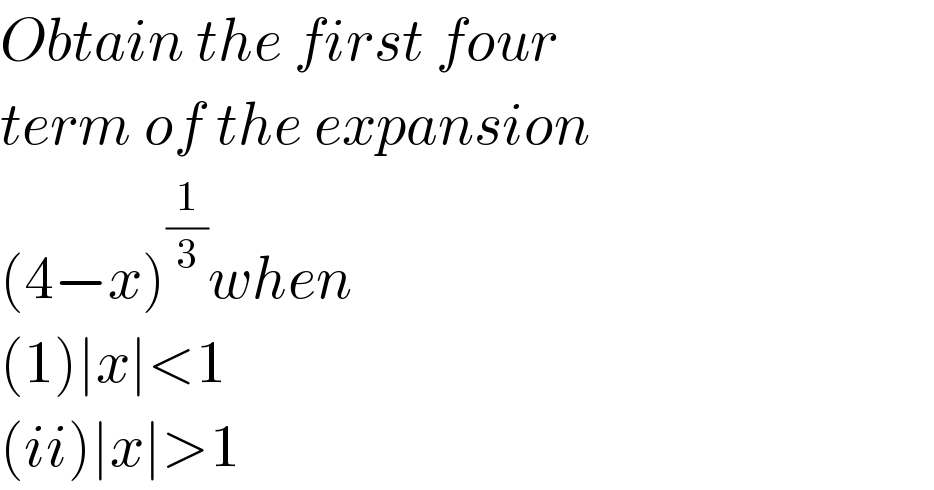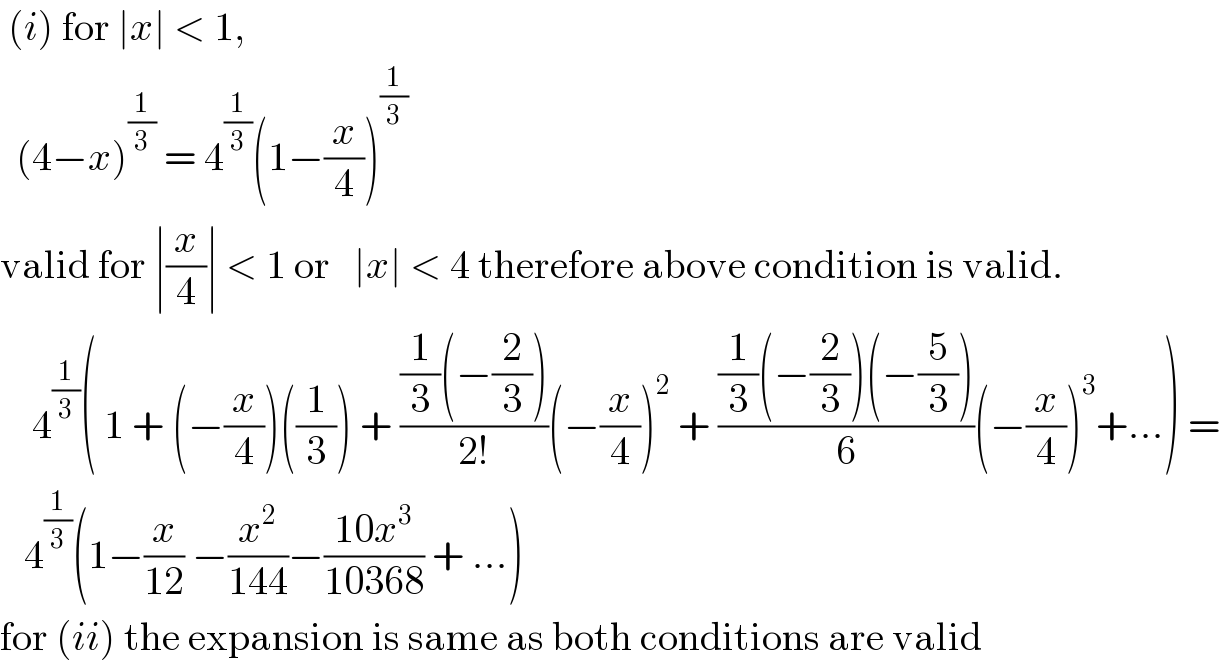Question Number 88039 by peter frank last updated on 08/Apr/20

$${Obtain}\:{the}\:{first}\:{four} \\ $$$${term}\:{of}\:{the}\:{expansion} \\ $$$$\left(\mathrm{4}−{x}\right)^{\frac{\mathrm{1}}{\mathrm{3}}} {when} \\ $$$$\left(\mathrm{1}\right)\mid{x}\mid<\mathrm{1} \\ $$$$\left({ii}\right)\mid{x}\mid>\mathrm{1} \\ $$
Answered by Rio Michael last updated on 08/Apr/20

$$\:\left({i}\right)\:\mathrm{for}\:\mid{x}\mid\:<\:\mathrm{1}, \\ $$$$\:\:\left(\mathrm{4}−{x}\right)^{\frac{\mathrm{1}}{\mathrm{3}}} \:=\:\mathrm{4}^{\frac{\mathrm{1}}{\mathrm{3}}} \left(\mathrm{1}−\frac{{x}}{\mathrm{4}}\right)^{\frac{\mathrm{1}}{\mathrm{3}}} \: \\ $$$$\mathrm{valid}\:\mathrm{for}\:\mid\frac{{x}}{\mathrm{4}}\mid\:<\:\mathrm{1}\:\mathrm{or}\:\:\:\mid{x}\mid\:<\:\mathrm{4}\:\mathrm{therefore}\:\mathrm{above}\:\mathrm{condition}\:\mathrm{is}\:\mathrm{valid}. \\ $$$$\:\:\:\:\mathrm{4}^{\frac{\mathrm{1}}{\mathrm{3}}} \left(\:\mathrm{1}\:+\:\left(−\frac{{x}}{\mathrm{4}}\right)\left(\frac{\mathrm{1}}{\mathrm{3}}\right)\:+\:\frac{\frac{\mathrm{1}}{\mathrm{3}}\left(−\frac{\mathrm{2}}{\mathrm{3}}\right)}{\mathrm{2}!}\left(−\frac{{x}}{\mathrm{4}}\right)^{\mathrm{2}} \:+\:\frac{\frac{\mathrm{1}}{\mathrm{3}}\left(−\frac{\mathrm{2}}{\mathrm{3}}\right)\left(−\frac{\mathrm{5}}{\mathrm{3}}\right)}{\mathrm{6}}\left(−\frac{{x}}{\mathrm{4}}\right)^{\mathrm{3}} +…\right)\:=\: \\ $$$$\:\:\:\mathrm{4}^{\frac{\mathrm{1}}{\mathrm{3}}} \left(\mathrm{1}−\frac{{x}}{\mathrm{12}}\:−\frac{{x}^{\mathrm{2}} }{\mathrm{144}}−\frac{\mathrm{10}{x}^{\mathrm{3}} }{\mathrm{10368}}\:+\:…\right)\: \\ $$$$\mathrm{for}\:\left({ii}\right)\:\mathrm{the}\:\mathrm{expansion}\:\mathrm{is}\:\mathrm{same}\:\mathrm{as}\:\mathrm{both}\:\mathrm{conditions}\:\mathrm{are}\:\mathrm{valid} \\ $$
Commented by peter frank last updated on 15/Apr/20

$${thank}\:{you} \\ $$
